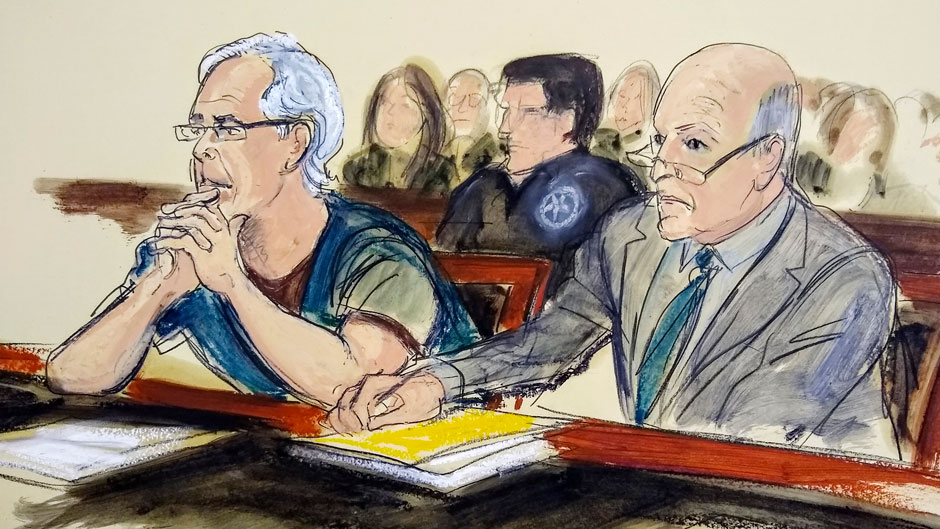Jeffrey Epstein is dead. Long live the conspiracy theories.
Only moments after the death of the multimillionaire and convicted sex offender was reported Saturday morning the internet exploded with speculation that the politically connected financier with deep roots in high society was taken out to prevent him from naming names.
Throughout the long saga of Epstein’s legal problems, including allegations that he and colleagues lured dozens of girls and young women to his Palm Beach mansion, private Caribbean island, and other locations—chronicled in the Miami Herald’s investigative series, Perversion of Justice—the names of powerful men connected to Epstein, his business interests, and sexual exploits continued to surface: England’s Prince Andrew, former New Mexico Gov. Bill Richardson, former Sen. George Mitchell, both President Donald Trump and former President Bill Clinton, and other politicians and prominent business leaders.
Officials said Epstein hanged himself while incarcerated in a Manhattan jail, and was found Saturday morning. He was reportedly not under suicide watch, despite Epstein being injured in an unexplained episode just days earlier. A short time later, the hashtag #EpsteinMurder was trending on Twitter, and the conspiracy theories mushroomed. In fact, Trump retweeted a theory that Epstein’s death might be tied to former President Bill Clinton.
Political scientist Joseph Uscinski, associate professor in the University of Miami College of Arts and Sciences, is co-author of American Conspiracy Theories, which examines why people embrace conspiracy theories. He discussed the growing conspiracy surrounding Epstein’s death.
It didn’t take long for the word “conspiracy” to be linked to Epstein’s death. Is this the next big conspiracy theory to emerge?
Even before Epstein’s death, some people believed he was connected to a grand conspiracy. Some believed that Epstein’s plea deal indicated shady dealings; others thought that Epstein’s attempted suicide last month indicated an assassination attempt. Part of this has to do with the idea that there are vast elite human trafficking rings, which depending on the theory, engage in satanic cults and cannibalism. It is no shock now that Epstein is dead that Twitter has exploded with baseless speculation.
Given the names that have been linked to Epstein, from royalty to politicians to powerful businessmen, does this conspiracy theory have a long shelf life?
Most people probably don’t know who Epstein is. The people engaging in the conspiracy theories about him are part of the small fraction of Americans that pay close attention to day-to-day political battles. It’s hard to tell if these theories will last. For example, after the death of Justice Scalia, many conspiracy theories claimed that President Obama killed the Justice. Those theories were socially relevant for a few weeks, but soon disappeared.
With Attorney General William Barr weighing in early and saying he was “appalled” by Epstein’s death, and many questions remain unanswered, how does that influence people’s perception of this?
Barr’s statement has thrown gas on the fire. Putting out a statement saying that, “Mr. Epstein's death raises serious questions that must be answered,” leaves open a huge door for people to guess what those questions are. Barr might be referring to questions about how a prisoner was allowed to commit suicide, but people might interpret his statement as asking if there is a vast shadowy conspiracy behind this “suicide.”
Can you compare this to anything that has happened in the past?
Tons and tons of things. The death of Scalia. The death of President Kennedy, and his brother Robert. The death of JFK Jr., who many people think is still alive and running with Trump as his VP selection in 2020. Many people believed Elvis faked his own death and is still alive somewhere.
Right now, the left is accusing Trump of having Epstein killed, and the right is accusing the Clintons of having him killed. Worse, mainstream journalists are engaging in this baseless speculation. While one reporter at the Washington Post is fanning the conspiracy theories on Twitter, another is writing articles condemning the president for engaging in the conspiracy theories. It’s a mess, and people need to breathe deep for a little bit.

